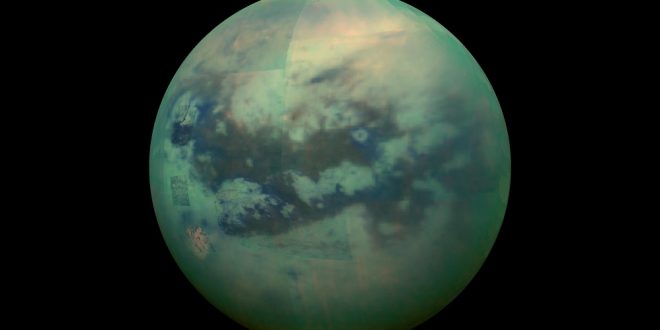Saturn’s biggest moon, Titan, is one of the most interesting bodies in the Solar System. It’s the only other place we know of, besides Earth, that very likely holds liquid water, in the form of a vast underground ocean, and its surface is somewhat Earth-like, splotched with lakes, rivers and seas, albeit of liquid methane and ethane.
Researchers at Cornell University have analyzed data of Titan’s chemical composition and found that conditions could be right for non-water-based life to evolve, challenging our Earth-focused ideals of habitability.
“This paper is a starting point, as we are looking for prebiotic chemistry in conditions other than Earth’s,” said Martin Rahm, postdoctoral researcher in chemistry and lead author of the new study, “Polymorphism and Electronic Structure of Polyimine and Its Potential Significance for Prebiotic Chemistry on Titan,” published in the Proceedings of the National Academy of Sciences, July 4.
To grasp the blueprint of early planetary life, Rahm said we must think outside of green-blue, Earth-based biology: “We are used to our own conditions here on Earth. Our scientific experience is at room temperature and ambient conditions. Titan is a completely different beast.” Although Earth and Titan both have flowing liquids, Titan’s temperatures are very low, and there is no liquid water. “So if we think in biological terms, we’re probably going to be at a dead end,” he said.
Hydrogen cyanide is an organic chemical that can react with itself or with other molecules – forming long chains, or polymers, one of which is called polyimine. The chemical is flexible, which helps mobility under very cold conditions, and it can absorb the sun’s energy and become a possible catalyst for life.
“Polyimine can exist as different structures, and they may be able to accomplish remarkable things at low temperatures, especially under Titan’s conditions,” said Rahm, who works in the lab of Roald Hoffmann, winner of the 1981 Nobel Prize in chemistry and Cornell’s Frank H.T. Rhodes Professor of Humane Letters Emeritus. Rahm and the paper’s other scientists consulted with Hoffmann on this work.
“We need to continue to examine this, to understand how the chemistry evolves over time. We see this as a preparation for further exploration,” said Rahm. “If future observations could show there is prebiotic chemistry in a place like Titan, it would be a major breakthrough. This paper is indicating that prerequisites for processes leading to a different kind of life could exist on Titan, but this only the first step.”
Agencies/Canadajournal

 Canada Journal – News of the World Articles and videos to bring you the biggest Canadian news stories from across the country every day
Canada Journal – News of the World Articles and videos to bring you the biggest Canadian news stories from across the country every day

